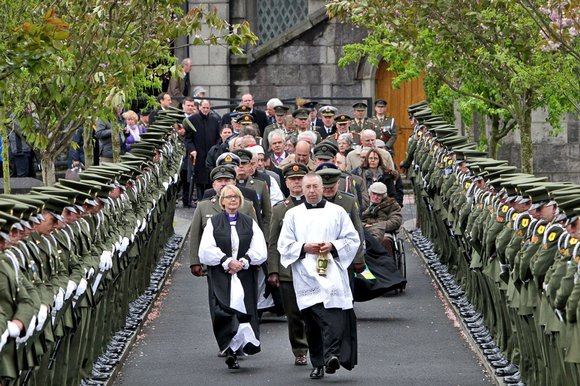
Still trying to read all the books I got for Christmas I’ve been dipping-into a recently-published collection of poetry by a local priest. His works of short and accessible verse are mostly on matters that might feature in a country curate’s sermons, except for one, which retells a story from his childhood, his trip to Dublin at Easter 1966. He recalls how he
“Felt at home
beneath the colours of the GPO”
Recalling a time when the display of the Irish tricolour was forbidden in his native part of Ireland. But the poem is subtitled “death of innocence” and recalls how the trappings of violent republicanism would take-on a different meaning in the years that were to come.
Despite its official condemnation of the 1916 Easter Rising the Catholic Church soon found an accommodation with the nationalist movement and was given a sizable stake in the new Irish state. By the time the fiftieth anniversary of the Easter rising came around the church was visibly involved in the commemorations. A recent article in The Irish Catholic referred to 1966, the rising’s golden jubilee as “A golden year” noting:
“The public commemoration of the Rising’s fiftieth anniversary was an almost exclusively Catholic phenomenon. Given the religiosity of most of those who took part in and led the Rising, and the overwhelmingly Catholic nature of society in the Republic of 50 years later, this was perhaps inevitable”
The year before the golden jubilee anniversary Galway’s Cathedral had opened, and featured in its resurrection chapel a mosaic of Patrick Pearse at prayer next to the Risen Christ and (perhaps even more incongruously) John F Kennedy. The Church was perhaps keen to shelter the image of Pearse and the rising’s leaders as a sort of choirboy-gun-club and in 1966 an article by Jesuit priest Fr Franics Shaw, deeply critical of Pearse’s religious overtones to the rising, was suppressed having been deemed “untimely and inappropriate” by an Irish Jesuit journal.
But as the priest’s poem illustrates, an innocence and nostalgia felt for the rising would not continue following the outpouring of violence as the decade drew to a close. The Church’s horror at the works of the IRA would lead clerics such as Archbishop Conway of Armagh to unequivocal condemnation, at a funeral for one of their victims he said:
“The persons responsible for such a barbaric act have…become less than human”.
So far in this centenary year there has been no evident suppression of clerical critique on the 1916 Easter rebels and their methods. Dublin newspapers have carried numerous attacks on the rising’s moral standing from the point of Catholic moral teaching, not least from The Irish Times religious correspondent Patsy McGarry, who called the rising itself:
Catholic philosopher Fr Seamus Murphy described as “deeply disturbing” the government’s planned commemorations of the rising. For his part the current Catholic Primate Archbishop Martin spoke of wanting to avoid “false glorification” of the rebels actions.
The centenary of the rising was never likely to gladden the hearts of many unionists, but whether or not it can maintain its imaginative power and resonance (that terrible beauty) with Ireland’s Catholics, in particular those in the North, was what drew me to priest’s poem in the first place. Last week’s condemnation of the rising from the Attorney General John Larkin were significant as they were not the words of some legal inquiry but they were given as an expression of Larkin’s Catholic morality.
One of Patsy McGarry’s issues with the rising centenary commemorations is that they are to be held on Easter Sunday and not and not the calendar anniversary of the rising (April 24-29). I’ve never seen an official reason for this, and the official handbook for this year states just that: “It’s long been tradition”.
Prior to its 1966 demolition some Irish republicans used to say that Nelson’s pillar in O’Connell Street overshadowed the country’s principal monument, the GPO. Catholics who want little or nothing to do with the physical force republicanism might feel the same about the fanfare surrounding the rising’s centenary commemorations as many will take place on Easter Sunday itself. Few could blame the Catholic Church or indeed other Christian denominations in Ireland from wanting to avoid any dilution of the message of Easter, and the rising it proclaims.
Discover more from Slugger O'Toole
Subscribe to get the latest posts to your email.
